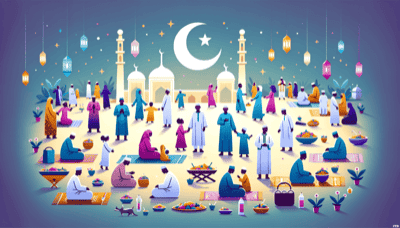We're here to help you keep count of the days to or since a date. Just click the button below and enter your chosen date to get started. Also choose the suggested days or search for a special day above #countingthedays

Eid ul-Fitr, known as the "Festival of Breaking the Fast," is a significant Islamic holiday celebrated in Ghana, marking the end of Ramadan, the holy month of fasting. The date varies yearly based on the Islamic lunar calendar.
The tradition originates from the Islamic prophet Muhammad and is rooted in religious teachings. In Ghana, Eid ul-Fitr holds a special place due to the country's diverse religious tapestry and the harmonious coexistence between Muslims and people of other faiths.
On this day in Ghana, Muslims gather early in the morning for communal prayers at mosques or designated prayer grounds. The atmosphere is festive, with many wearing new or their best clothes to symbolize renewal and purity. After prayers:
Almsgiving: It's customary for Muslims to perform "Zakat al-Fitr," a form of charity given to the poor to enable them to celebrate as well.
Feasting: Families and friends come together to enjoy special meals that often include local dishes such as jollof rice, waakye (rice and beans), and an assortment of meats.
Socializing: People visit each other's homes to share food and well wishes. It's also common for children to receive small amounts of money or gifts from elders.
Unity: Eid strengthens community bonds and emphasizes reconciliation. People are encouraged to forgive any past grievances.
Eid ul-Fitr serves as an opportunity not just for celebration but also for reflection on spiritual growth achieved during Ramadan. While it is predominantly observed by Muslims, people from different religious backgrounds often extend greetings to their Muslim friends in a show of solidarity.
In summary, Eid ul-Fitr in Ghana is marked by prayers, charity, feasting, socializing, unity among communities, and peaceful coexistence across diverse religious groups.